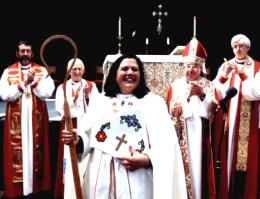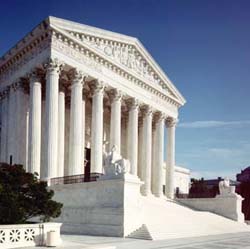(this article has been re-written because the original was unclear)
The Church of England (C of E) has decided to
move forward toward offering the bishopric to women. The C of E currently ordains women as priests and deacons, but not as bishops. I have often thought that the C of E's position on women's ordination was a clever compromise position. After all they DO allow women to be clergy in charge of a local parish, on the other hand they don't allow women to be the bishop, the truly "senior pastor." But such a compromise is probably only acceptable for the undecided.
Rome (along with the Eastern Orthodox) has said that such a move toward female bishops will further separate Anglicans from the rest of the Historical church and make ecumenical diologue aimed at full communion much more difficult. Naturally, the inovative Episcopal Church in the US has been doing women bishops for a while now, been there, done that (except for a few dioceses that do not ordain women at all). My own United Methodist Church elevated our first woman to the episcopate in 1980 and there are a number of them now. And of course in 2006 we UMs are (most of us) celebrating 50 years of women's "clergy rights".
Now I dislike the language of "clergy rights" for men or for women since I believe that we have no "rights" over against God - only gifts to be recieved from him - among which ordination is a great one. Of course, though God certainly loves all people it does not follow that he gives the same gifts to all - he gives gifts as he pleases. And it is even possible that it may please God to give certain gifts to men and not to women or to women and not to men (consider the awesome gift of carrying children within the womb that God has given to women alone).
I have worked with a number of female clergy on a close basis. And I must report mixed impressions of their theological and pastoral giftedness. Some are very good. As someone who thinks of himself as moderately conservative and Evangelical in theological orientation (with a mean Catholic streak) I must confess that I prefer to see a man behind the chancel if given a choice (just in case the Catholics are right). But I do know of some very prominent Protestant and Non-denominational female-pastors who seem to be quite effective and well-respected - in addition to the women clergy that I have known to be quite gifted. I was pretty much in favor of female clergy when I arrived at my mainline Protestant seminary. On my first day I heard a statistic given by a liberal Episcopal Priest that caused me to quiestion that support. 85% of female clergy, he said, will experience a divorce while in ministry; their families will fall apart (compare this with 1 Tim. 3:4, in which a bishop must guide their family well). That is almost 9 out of 10! - much higher than rates among male clergy (which basically mirror the general population).
I have since heard that women also leave the ministry at a higher rate than men. It is also a fact that the vast majority of churches that are very successful (by any standard that can be measured) are pastored by men (though since the great vast majority of clergy are men, this may mean little). These "red flag" observations have caused me to rethink my support.
It may be that the Baptists and Catholics and Orthodox and many others are right - that God does not intend women to be pastors. Having learned more about the differences in men and women's brains, I wonder if leadership in ministry makes demands that (most) women are simply by design less able to meet (and presumably more than men able to meet other demands for other functions). If this were true it would come as no surprise if God did not call women into ordained ministry at all, or if he did it would be an exceptional case (all women Christians are called into ministry by virtue of their baptism, and many - such as nuns - are set apart to a special consecrated, but not ordained, ministry).
There is also the issue of lack of male church involvment - could it be exasperated by female leadership? If these things are so, I still wouldn't want to rule women out categorically, but maybe a woman who really is able and called to do ministry must be exceedingly rare.
As I was honestly thinking and struggling about this, I ran across articles from 2 of my top ten theologians, both members of the Church of England and both moderate & Evangelical intellectuals, who wrote on this subject (and they disagree with one another!). So if you really want to investigate it, I encourage you to take the time to read these.
C.S. Lewis thought "
Priestesses in the Church" were a bad idea when it was first suggested. Yes, he says it seems to be perfectly rational and makes good sense considering the world we find ourselves in, but Christianity is often supra-rational and doesn't always conform to the thinking of our times - there are reasons to believe, he says, that God does not intend women for ordained leadership in the Church Catholic. He also thinks the ordination of women suggests by its symbolic value that we ought to change our metaphors for God as well: that they could just as well be feminine as masculine. But he (rightly) points out that a religion that worships a goddess is not the Christian faith. Presumably, he (following the Apostles, I think) does not have a problem with deaconesses. Lewis was certainly correct that people would leave the C of E if it ordained women, many "went to Rome" when it did in fact happen.
N.T. Wright, on the other hand, thinks much of our (male-only) tradition is simply a misunderstanding of the scriptures because we have lost touch of the context in which Paul was writing these letters that seem at first glance to exclude women for leadership. That is to say, the traditional view is, in his opinion, un-biblical. He examines the relevant Biblical texts in context and proposes that we mis-understand them because we don't know the context and that this mis-understanding has affected the translation history so that translators are now even more likely to choose English wordings that reflect the mis-understanding, whereas an alternative translation that is equally faithful to the Greek would be suggestive of his reading that actually encourages women leaders in the church. The
article is quite challenging if you hold the traditional view because he makes some compelling arguements. Wright does not address the "qualifications for bishops" in 1 Tim. 3; but presumably he would argue that the use of masculine pronouns should be taken as generic.
So I honestly am torn and feeling a bit agnostic over the issue. I can see good arguments both ways. If I follow my "paleo-orthodox" theological method that reads Scripture through the lens of the ecumenical Church's living tradition, emphasizing that which is most commonly held (oftentimes, that which is earliest), then I am tempted to side with Rome on this issue. On the other hand, Tom Oden, the theologian from whom I learned my paleo-orthodoxy to begin with, makes an argument
in favor of women's ordination in his excellent book
Pastoral Theology - which I appreciate since so many of the arguments I hear in favor of women's ordination are simply some vague, thoughtless, and un-warranted jump from "since God loves everyone" or "since the new covenant of salvation is available to everyone" (often pointing to Galatians 3:28 as if Paul was speaking about ordination) it therefore follows women ought to be ordained
. But this does not necessarily follow.
If our church wants to defend the practice and continue to hold that the Bible is indeed the final authority for our faith and practice (as
The Book of Discipline repeatedly asserts), then sharper, deeper, and more thoughtful Biblical arguments need to be made (and N.T. Wright's article above may be a good place to start thinking through these things).
What do you informed readers think on this one?
Labels: Anglicanism, C.S. Lewis, Ecclesiology, N.T. Wright, Theology and Ministry

 The Church of England (C of E) has decided to move forward toward offering the bishopric to women. The C of E currently ordains women as priests and deacons, but not as bishops. I have often thought that the C of E's position on women's ordination was a clever compromise position. After all they DO allow women to be clergy in charge of a local parish, on the other hand they don't allow women to be the bishop, the truly "senior pastor." But such a compromise is probably only acceptable for the undecided.
The Church of England (C of E) has decided to move forward toward offering the bishopric to women. The C of E currently ordains women as priests and deacons, but not as bishops. I have often thought that the C of E's position on women's ordination was a clever compromise position. After all they DO allow women to be clergy in charge of a local parish, on the other hand they don't allow women to be the bishop, the truly "senior pastor." But such a compromise is probably only acceptable for the undecided. I just read a fascinating article at Touchstone, "A journal of Mere Christianity," that asks why 5 of the 9 US Supreme Court Justices are Catholics, all appointed in the last 20 years, on a court that has been historically dominated by "Mainline" Protestants, including only 7 other Catholics in the last 200 years.
I just read a fascinating article at Touchstone, "A journal of Mere Christianity," that asks why 5 of the 9 US Supreme Court Justices are Catholics, all appointed in the last 20 years, on a court that has been historically dominated by "Mainline" Protestants, including only 7 other Catholics in the last 200 years. In response to a "deepening humanitarian crisis" in Bethlehem and other parts of the West Bank since the election of Hamas leadership, Rowan Williams the Archbishop of Canterbury has called for more Western Christians to visit the Holy Land:
In response to a "deepening humanitarian crisis" in Bethlehem and other parts of the West Bank since the election of Hamas leadership, Rowan Williams the Archbishop of Canterbury has called for more Western Christians to visit the Holy Land: I have a book on my shelf that I have not yet read with a very interesting title: The Church Impotent: The Feminization of Christianity. Have you ever noticed that the overwhelming majority of the people doing the ministry of the churches are women? I have. And I suspect it wasn't always so.
I have a book on my shelf that I have not yet read with a very interesting title: The Church Impotent: The Feminization of Christianity. Have you ever noticed that the overwhelming majority of the people doing the ministry of the churches are women? I have. And I suspect it wasn't always so.